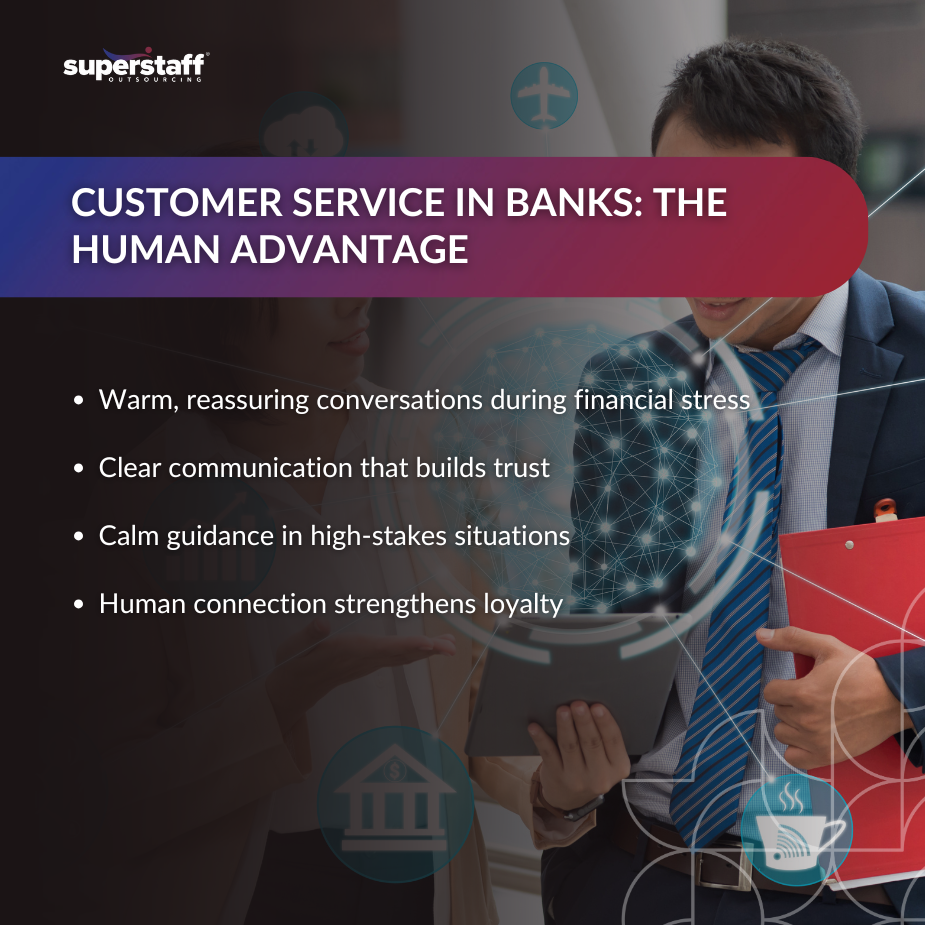
Banks today run on screens. Customers check balances through apps, report issues through chat widgets, and complete transactions without stepping inside a branch. This level of efficiency has redefined convenience, but it has also created distance.
When money feels uncertain, digital efficiency alone cannot reassure someone. This is where customer service in banks becomes more than just answering inquiries.
Filipino agents play a role in maintaining human trust in this increasingly automated environment, offering calm, clarity, and genuine presence at moments when customers need it most.
Banks Operate Not Just on Transactions, But on Trust
Trust is the quiet foundation of the banking relationship. It is not written in the fine print of an agreement, yet it determines whether customers feel safe leaving their money in your institution. When something feels unclear or unfamiliar, people seek reassurance from another person rather than a system.
This is why, even with advanced digital tools, individuals still reach out to contact centers when the situation matters. At moments like these, the tone, patience, and sincerity of the person assisting them influences whether trust is strengthened or eroded.
In a world built around speed and automation, reassurance requires something software cannot replicate. The ability to read emotional cues, sense hesitation, and respond in a way that reduces anxiety is not a technical function. It is a human one. Filipino agents are known for their capacity to deliver that kind of emotional steadiness.
When integrated effectively, they help sustain confidence around banking interactions that might otherwise feel transactional and cold. As services continue to digitalize, customer service in banks becomes a key differentiator in competitive markets, not just a support function.
Filipino Cultural Values Naturally Align With Trust Building
There is something distinctively human about how Filipinos communicate. It is warm without being intrusive. Polite without being scripted. Thoughtful without feeling performative. These qualities arise from cultural values deeply rooted in how Filipinos view interpersonal relationships. The concept of “malasakit” speaks to genuine concern for others. It reflects an instinct to not just assist, but to care about the outcome for the person they are serving.
This cultural approach creates a tone that customers recognize as comforting, especially when conversations involve financial stress. The Philippines also has a long history of cross-cultural communication, making its workforce highly attuned to Western conversational norms.
The result is service that feels natural rather than forced. It supports a banking customer experience that prioritizes clarity and calm. By building rapport authentically, Filipino agents help reinforce the customer’s sense of being understood. And in the context of finance, feeling understood is a powerful trust signal.
Human Reassurance Matters Most in High-Stakes Banking Scenarios

Customers rarely call for simple questions anymore. They turn to contact centers during moments that carry emotional weight. A card blocked unexpectedly. A pending transaction that seems unfamiliar. A loan approval waiting for review. Even something as simple as password lockouts can trigger anxiety when tied to financial access.
During these moments, what customers want is not just the fix, but emotional steadiness from the one guiding them. There is a meaningful difference between reading lines from a script and speaking from a place of understanding.
Filipino agents have a natural ability to offer reassurance through tone and pacing. They help customers feel safe enough to move through uncertainty. These interactions do not just resolve tickets.
They reinforce confidence in the institution. And that confidence influences long-term loyalty. It is one of the reasons customer service in banks continues to hold strategic importance even in digital systems.
Technology and Filipino Agents Create a Strong Hybrid Support Model
Digital banking is here to stay. Automation reduces wait times. Self-service portals handle frequent tasks. AI routes inquiries more efficiently. But no bank can rely solely on automation if it wants to preserve customer trust. The strongest banking support models use technology for efficiency and human agents for emotional clarity.
In practice, this looks like chatbots handling simple requests so Filipino agents can focus on complex or sensitive ones. It means automated verifications paired with a real person who can walk a customer through a stressful situation.
It is a hybrid model where both elements strengthen one another. In this environment, Filipino agents become essential in shaping the banking customer experience because they ensure the human dimension never disappears. Customer service in banks is evolving, but it is not fading. It is transforming into something more meaningful.
Filipino Banking Support Teams Are Trained for Both Compliance and Connection
Banking requires precision. Every interaction must be secure, accurate, and compliant. Filipino agents who support financial services roles undergo extensive training on data handling, identity verification, and privacy regulation. This training ensures that customers receive clear and confident guidance, even during complex account issues.
What makes Filipino banking support teams stand out is the combination of technical competence and emotional steadiness. They do not simply relay procedures. They explain processes in ways that feel clear rather than intimidating.
They manage escalation calmly. They maintain a presence that reassures customers that everything is being handled carefully. Customer service in banks becomes not just functional, but trust reinforcing, when delivered through this level of care.
Investing in Human-Centered Service Strengthens Long-Term Banking Relationships
Loyalty is not built through technology alone. It is built through how customers feel when they interact with a bank, especially during stressful situations. Positive experiences encourage repeat engagement. Negative experiences linger and influence decision-making long afterward.
Filipino agents offer something that automated systems cannot. They provide emotional grounding. They take the time to ensure the person on the other end feels supported and respected.
This contributes to a banking customer experience rooted in trust and care rather than efficiency alone. Customer service in banks becomes central to brand identity. Over time, customers associate the bank with feeling safe, heard, and guided with professionalism.
For organizations looking to scale these outcomes sustainably, banking customer service outsourcing to the Philippines offers a strategic solution. Filipino service culture aligns with the relationship-driven nature of financial trust. The result is stronger long-term customer relationships that support stability and growth.
The Strategic Advantage of Cultural Empathy in a Digital Banking World
No matter how advanced digital systems become, money will always carry emotional meaning. People need to feel safe when discussing it. That is why banks that invest in human-centric service models gain a competitive advantage.
They differentiate themselves not through features, but through the feeling they create. Filipino agents excel in bringing this feeling into every interaction.
The truth is that how Filipino agents improve customer service in banks is through their natural integration of warmth, clarity, and patience into every conversation. The value lies not in performance metrics alone, but in human connection that customers remember.
Sustaining Trust in an Automated Financial Future
As banking continues to evolve, the human touch will remain the stabilizing force. Applications, AI systems, and automated workflows increase convenience. Filipino agents ensure those systems feel trustworthy. Customer service in banks is shifting from transactional problem-solving to emotional trust reinforcement. And the Philippines is uniquely positioned to lead that shift.
For decision-makers seeking long-term growth, sustainable differentiation will come from blending digital efficiency with human empathy. Banking customer service outsourcing makes that possible when approached with the right cultural partnership.
Customer Service in Banks as the Foundation of Trust
In a digital-first world, the institutions that will stand out are the ones that keep their service human. Filipino agents play a crucial role in protecting the trust that technology alone cannot secure.
They bring warmth, patience, clarity, and care into moments when customers feel uncertain, and that is something no automated system can replace. Customer service in banks becomes the defining factor when reassurance matters more than features. SuperStaff supports banks in building service teams that honor both efficiency and human connection.
With Filipino agents leading customer service in banks, the experience remains personal, calm, and trust-centered. If your organization is ready to strengthen trust, loyalty, and long-term customer relationships, SuperStaff can help you build a Filipino banking support team that reflects your values and delivers service your customers will remember.






